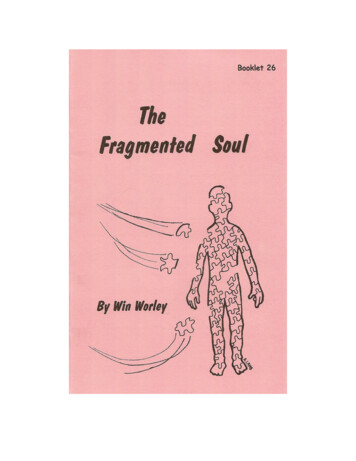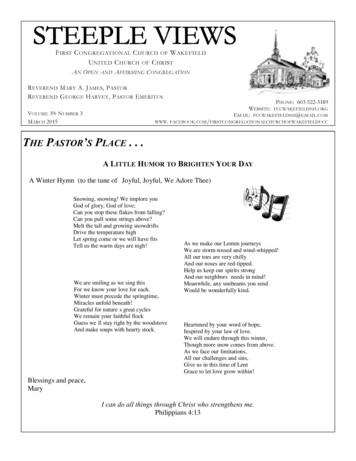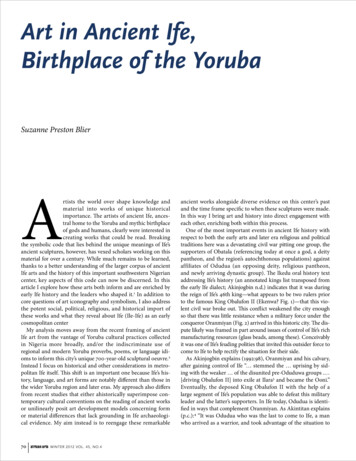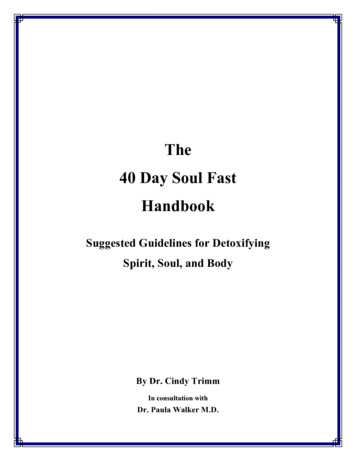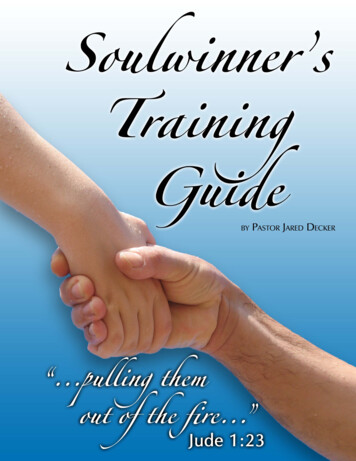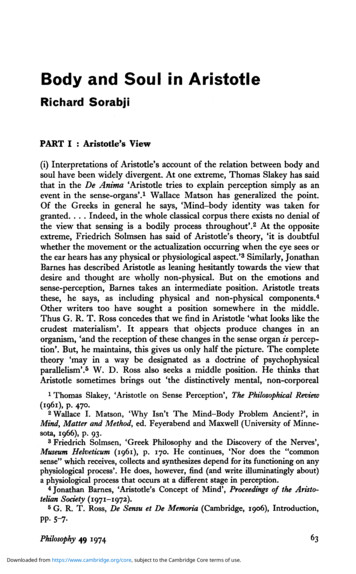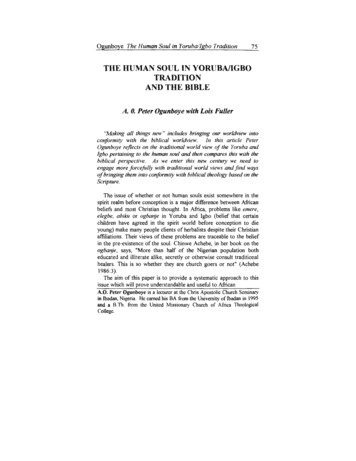
Transcription
Ogunboye The Human Soul in Yoruballgbo Tradition75THE HUMAN SOUL IN YORUBA/IGBOTRADITIONAND THE BIBLEA. 0. Peter Ogunboye with Lois Fuller"Making all things new " includes bringing our work/view intoconformity with the biblical work/view. In this article PeterOgunboye reflects on the traditional world view of the Yoruba andlgbo pertaining to the human soul and then compares this with thebiblical perspective. As we enter this new century we need toengage more forcefully with traditional world views and find waysof bringing them into conformity with biblical theology based on theScripture.The issue of whether or not human souls exist somewhere in thespirit realm before conception is a major difference between Africanbeliefs and most Christian thought. In Africa, problems like emere,efegbe, abiku or ogbanje in Yoruba and Igbo (belief that certainchildren have agreed in the spirit world before conception to dieyoung) make many people clients of herbalists despite their Christianaffiliations. Their views of these problems are traceable to the beliefin the pre-existence of the soul. Chinwe Achebe, in her book on theogbanje, says, "More than half of the Nigerian population botheducated and illiterate alike, secretly or otherwise consult traditionalhealers. This is so whether they are church goers or not" (Achebe1986:3).The aim of this paper is to provide a systematic approach to thisissue which will prove understandable and useful to AfricanA.O. Peter Ogunboye is a lecturer at the Chris Apostolic Church Seminaryin Ibadan, Nigeria. He earned his BA from the University of Ibadan in 1995and a B.Th. from the United Missionary Church of Africa TheologicalCollege.
76 Africa Journal o[Evangelical Theology 19.1 2000Christians, and to provide biblically approved solutions to problemsrelating to the soul.THE BIBLICAL VIEW OF THE "SOUL"The Hebrew word for the soul, nephesh, and its Greek equivalent,psyche, "have a number of shades of meaning and accordingly it isoften difficult to translate" (Green 1970:901). The ancient Hebrews"took the soul to be whatever it was in a body which made it alive,made it a living rather than a dead thing. This animating force wasbelieved to reside in the blood" (Shatfer 1968:2). The soul was thenon-material part of man, the real person, who thinks and feels andwilJs, the seat of spiritual and moral qualities.Theologians do not agree whether the Bible teaches that man ismade up of two parts (dichotornist theory) or three parts(trichotomist theory). In the dichotornist theory, man is made up ofthe material part (body) and the immaterial (soul or spirit). In thistheory, soul and spirit are taken to be synonyms or aspects of thesame thing. The trichotornist theory, popularized by Watchman Nee,holds that man is made up of body, soul and spirit. The spiritperceives spiritual matters and responds to spiritual forces, while thesoul deals only with reason, emotion, and personality.The creation story in Genesis refers directly to the two aspects ofman. God created the body of Adam out of the dust, and breathedinto him the breath of life, and the result was a living soul or livingbeing. Here body plus spirit equals soul. Perhaps soul is what bindsthe body and spirit together.TRADITIONAL VIEW OFTHE COMPOSITION OF Hl'MAN BEINGSThe Yoruba and Igbo views of the component parts of man aresomewhat different. They certainly see man as having a material part(the body) formed from dust (by Obatala in Yoruba myth) and animmaterial aspect.This immaterial aspect is not simple "Paradoxically, man is one,but the self is multiple" (Metuh 1991:11 0). Man can exist in hismaterial body or in a spirit body.
Ogunboye The Human Soul in Yorubaifgbo Tradition77In Yoruba thought, the immaterial part of a person consists firstlyof emi (the life-force which makes him breathe). It is not clearlystated where the emi goes after departing from the body at death.The Igbo use the term obi (heart) for "a man's life-force, theanimating principle which links man with other life-forces in theuniverse" (Metuh 1991: 110-111). The breath can sometimes leavethe body in dreams and could also come under the influence ofwitchcraft. At death, the obi leaves the body but it does not survive.Metuh says, "at death, the breath ceases to exist" (Metuh 1987: 174).The second component is the Yoruba term okan (heart). For theYoruba, the heart "is the seat of the emotion and psychic energy"(ldowu 1962: 170).The Yoruba also have something called the ori (head). This is thepersonality soul. The physical head is the symbol of the inner person.God puts the ori in man. Before the ori is sent into the world, itkneels before God to receive its destiny. The ori also functions as aguardian spirit of the person, so sacrifice is made to it. It is theessence of personality, hence it must be kept in good condition sothat it may be well with the person, and so that it may favour one.The Igbo have a similar concept in the chi. The chi is thedestiny-spirit which is believed to be an emanation of the Creator. Itis a sort of spirit double or guardian genius associated with theperson from the moment of conception. When a person dies, his chigoes back to God to give account of his work on earth. A man'sabilities, faults or misfortunes are ascribed to his chi. When a personreincarnates, he is given a different chi by God, with a different kindof destiny in life. A person must achieve his chi 's destiny in life to besuccessful. Each individual has his or her own cult where he or shepropitiates the chi. However, a person who is yet to have a child onlyshares in the propitiation of his parents' chi. One establishes one'sown cult after becoming a parent.The lgbo also have the eke, "the spirit of a deceased ancestor whoreincarnates in a child. It is assigned to the individual by God atconception. An ancestral guardian can incarnate in several people atthe same time" (Metuh 1987: 112). Each person has an altar for hiseke at the family ancestral shrine, where he offers sacrifices to his ekefor good fortune. The eke is the ancestral guardian which links manwith his family clan. It is believed to be an ancestral shade incarnate
78 Africa Journal o[Evangelical Theology 19.1 2000in each new baby. The baby takes after the eke in appearance and/orcharacter. Parents may have to consult a diviner to find out who theeke is of a new child because if the child does not follow theregulations of his eke, he may fall sick or die. The shadow isassociated with the self both in Yoruba and Igbo concepts of humanimmaterial nature. Among the Yoruba, it is ojiji. "The shadow castby a living human being on a sunny day is a sign of the presence ofthe self in the living human being" (Metuh 1987 172). When the selfleaves the body at death, the shadow ceases to exist, hence thecommon belief that corpses do not cast shadows. It is believed thatcertain things can be done against the shadow while the person isalive which will have its effect on the person's body, such as attackwith charms. The Igbo shadow spirit (onyinyo) in the Igbo view isthe visible form of the shadow cast by the human body. It is theshadow-sprit that incarnates in the body and is assigned an ancestralguardian. "He survives after death as an individual person and can inturn become an ancestral guardian" (Metuh 1987 180).BIBLICAL VIEW OF THE ORIGIN OF THE SOULThat the disciples asked Jesus, "Who sinned, this man or hisparents, that he was born blind?" (Jn 9 2) seems to indicate to somepeople that the Jews believed in sin before conception A fewChristian theologians (such as Origen) have held to an idea thathuman souls sinned before conception and therefore were sent intothe world to suffer and be cleansed. However, as Hodge says, "Itdoes not pretend to be a scriptural doctrine and therefore cannot bean object of faith" (Hodge 1973 JI, 66). Furthermore, it is also saidof the theory that "it makes the body something accidental" (Berkhof1988J 97). This is because at first, according to the theory, the soulwas :without the body. Man is therefore complete without the body ifhe can exist consciously in a world of pre- existence.Since the Bible does not speak of the creation of any man beforeAdam, or of any human apostasy before his fall, we have no biblicalbasis for believing in the pre-existence of souls.Among biblical theologians, there are some who believe that aseach child is conceived, God creates a new soul ex nihilo to go withthe conceived body. The soul is not generated or derived from the
Ogunboye The Human Soul in Yoruhm1gbo Tradition79parents but created by the immediate agency of God. The Greek andLatin Churches favoured this theory, while the Lutherans andReformed Churches were divided. Those who support this theory sayit shows how Jesus could be conceived of a tainted human being andyet be sinless in his soul. The main difficulty with this theory is howto account for the sinfulness of all other human souls. Does Godcreate the souls sinful? This seems unlikely. Another problem is thatGenesis 2:2 says that God rested from creating on the seventh day.No end of the seventh day was mentioned .The other main Christian theory about the origin of human souls iscalled traducianism. According to this theory "the souls of men arepropagated along with the bodies by generation and are thereforetransmitted to the children by the parents" (Hodge 1973 :67). Thistheory accounts for the transmission of the sinful nature, as well asother non-material characteristics by which children resembleparents. It does not, however, explain how Jesus' human nature couldbe untainted by sin.Scriptural support for this view includes: 1) God only breathed thebreath of life once into the nostrils of man and has given theresponsibility of procreation to man since then. When Eve was made,there was no new breath. She got both her soul and her body fromAdam. 2) God ceased his work of creation after the sixth day. To saythat God keeps creating new souls seems to violate this rest. 3) InHebrews 7:9-10 (compare Genesis 46:26) it says that Levi was stillin the loins of his ancestor Abraham when he met Melchizedek.Whether we accept a creationist view or a traducian view of theorigin of the human soul, the fact remains that the biblical view isthat human souls originate as entities at conception and not before.AFRICAN TRADITIONAL BELIEFS ABOUTTHE ORIGIN OF THE SOULWhen considering the origin of the soul from an Africanperspective, it is best explained and understood under two headings.These are Pre-existence and Reincarnation.
80 Africa Journal of Evangelical Theology 19 .l 2000Pre-existenceBelief in the pre-existence of the soul forms the basis for the issueof the soul in African belief Pre-existence of the soul is bestunderstood in the light of the destiny of man. The Yoruba believethat the ori receives the ipin (destiny) before a man is born. It kneelsbefore God and chooses or receives the destiny. "The generalpicture, therefore is of a complete 'person' kneeling beforeOlodumare to choose or receive" (ldowu 1962: 174). Imasogieconfirms this by saying, "Before coming to birth, each person, in theform of his personality, chooses a destiny which he desires toactualise on earth" (Imasogie 1985:50). Then the person starts hisjourney into the world. Some spirits make other agreements beforeincarnation, such as the emere spirits who form a pact among agroup of them to all come back to the spirit world quickly withoutgrowing old in the world.The Igbo concept is similar. God (Chukwu) gives the chi to theindividual and that individual enters into an oath agreement with hischi about his destiny and what will happen to him in life. On his wayto the world, the person has to pass interrogation by two femaledeities, who may try to influence him to renege on the oath andchoose a different life. Both the Yoruba and the Igbo believe thatonce a person is born, he does not consciously remember about theagreements he made before his birth, but a diviner can reveal them tohim. If he is getting into trouble, he may go to find out if he isunlawfully deviating. The ori or chi still knows about the destinyhowever, and should guide the person to fulfil it.The Igbo and Yoruba also believe that God is still creating morehuman spirits in the spiritual world all the time. These newly createdpeople are later born, although new babies are reincarnations ofancestors. The new baby is somehow a new creation as well as beinga reincarnation.ReincarnationThe concept of reincarnation in African belief is different from thePlatonic, Asian or classical view of the transmigration of souls. InAfrica belief, "there is no reincarnation in the classical sense. One canonly speak of partial or more precisely, apparent reincarnation"(ldowu 1976:-187). This is because it is believed that ancestors return
Ogunboye The Human Soul in Yoruba/Igbo Tradition81in one or several children in the family. Even when an ancestorreturns, he can still be venerated at the ancestor shrine. The soul ofthe man who reincarnated still has its own individual existence in thespiritual abode while some characteristic traits of him are mademanifest in his grandchildren. Only aged, good people who havedirect descendants and were properly buried can reincarnate.We can see from the above that in African belief, the origin of thenon-material part of a human being comes from diverse sources,including fresh creation by God (some part of which is inpre-existence), assignment of a guardian spirit by God andreincarnation of an ancestor.THE DESTINATION OF THE SOUL IN THE BIBLESome people hold that the soul ceases to exist altogether at death.This idea is called annihilation. Neither the Bible nor AfricanTraditional Religion accepts this view.According to the Bible, physical death is a termination of physicallife by the separation of body and soul. It only marks the end of ourpresent physical life. The Bible presents three important stages of thesoul after physical death. These are the intermediate state,resurrection and eternity. It also presents two important destinationsof the soul, which are heaven and hell.The intermediate state is the state of souls between the time ofdeath and resurrection to judgement. For believers, it seems that theirsouls immediately enter the presence of the Lord during this time (2Co 5: 1-8) and the wicked enter a place of suffering (Lk 16:23-1 2 Pe2:9). At the resurrection, both the righteous and the wicked dead willbe raised, the former enter heaven proper, and the latter are sent tothe eternal lake of fire.DESTINATION OF THE SOUL IN AFRICAN BELIEFAfrican belief includes the continuing life of the soul after physicaldeath.To the Yoruba, natural death occurs when the days of the destinychosen by the ori are complete. A death is only considered natural ifthe person is very old and does not die in an accident. Death of this
82 Africa Journal of Evangelical Theology 19.1 2000nature is a good thing because it provides the transitional processthrough which man completes his journey on earth. The aged areaware that they will soon die. They say, "I am going home." It is nota terrible thing, but good and natural.Burial rites reflect belief in life after death. Some rites provide away for the spirit of the deceased to join the ancestors in their abodein the spirit world. This is important so that the deceased will notbecome a homeless ghost troubling the living. There is often aceremony some time after the burial to send off the spirit of thedeceased, who is believed to have been hanging around for a while.Messages are sent to those who died previously through thedeceased, and things are put in the grave for him to take along on hisjourney to that place. Other rites permit a happy reincarnation of thedeceased.There are also rites to establish veneration and communicationwith the deceased as he now becomes an ancestor with spiritualpowers to help and discipline his living relatives. Libations, sacrificesand other feasts and ceremonies are held in their honour regularly.Departed ancestors have a big stake in the continuation of the familysince they hope to come back into the world through it byreincarnation. Therefore they are expected to guard the familywell-beingThe Yoruba say that the good deceased live in the "good heaven,"with God and the divinities, while those who lived evil lives go to the"heaven of potsherds" . Not all African traditions make thi sdistinction, though wicked people are usually not regarded as beingreceived by the ancestors. There is no reincarnation for those in thebad heaven or who are not received by the ancestors.Sometimes women do not become ancestors in the sense of beingvenerated for blessings. Among the lgbo, only some sections do itMetuh says that the final end of and the aspiration of every Igbo is toreach the spirit land of his ancestors, to be venerated by hisdescendants as an ancestor, and eventually to reincarnate (Metuh1991120) .
Ogunboye The Human Soul in Yoruballgbo Tradition83BIBLICAL THEOLOGY OF PREMATURE DEATHGenerally speaking, the Bible's view is that there are three mainreasons for early death . People die young because they are afflictedby enemies, such as the death of the Hebrew babies in Egypt, Ex1:16, and the death ofJob's children, Job 1: 18-19, which was causedby Satan. There are also instances 'where Jesus performed miraclesthat reveal the cause of premature death to be the work of demons( eg Mt 17: 14-18, where the demon was working to kill the boy). Asthe scripture says, the thief comes only to steal and kill and destroy(Jn 10:10)Early death can also come as a punishment from God (such as thedeath of Er and Onan, Ge 38-6-10, and of David's first child byBathsheba, 2 Sa 12:14) or as a way of rescuing them from greaterevils to come if they should live (as revealed in lsa 57 1 and the deathof Abijah, son ofJeroboam, in 1 Ki 14:1-18). We can infer from thislast case that although God says, "With long life will I satisfy him"(Ps 9116) that the scripture is not rigid that everybody should livetill his old age before fulfilling the will of God for his life. Christ, forexample, spent only thirty-three and a half years on earth and wasable to fulfil his mission on earth after which he died . Moreover, oneshould expect to see little children in heaven, for it is not how longone lives that matters but how well such a life is lived in accordancewith the will of God.AFRICAN TRADITIONAL BELIEF ABOUTPREMATURE DEATHln most African cultures, including that of the Yoruba, death at anearly age is never seen to be a natural event. Even if the natural causeis obvious, they always ask, "What killed him or her?" They may goto a diviner to find out who is responsible. Usually the oracle namessomeone who has used sorcery or witchcraft to cause the event orsickness that killed the young person. The person named is often afamily member and this leads to a lot of division and suspicion infamilies. On the other hand, the diviner may reveal that the child oryoung person was an abiku, a child who had covenanted in his preexistence to die young.
84 Africa Journal o[Evangelical Theology 19.1 2000If a person is killed before the time set in his destiny, peoplebelieve that such a person appears as a tangible and living ghost insome remote town, where he lives out his normal life-span as anormal person. He cannot be accepted yet into heaven because hehas not fulfilled his destiny. If however, he is discovered by someonewho knows he is dead, he disappears. The Yoruba call this akudaya.Since the person disappears, no one has ever been able to bringconcrete proof of this phenomenon to others for verification.Occasionally it is believed that a person could be killed young byGod because of his wickedness. Evidence is in the kind of death aperson has. If he dies by suicide, strange accident, or certain diseasessuch as leprosy, dropsy, smallpox or epilepsy, this is taken asevidence that his death is a punishment from God. Such people arenot given full funeral rites and cannot become ancestors (Metuh1987: 137).The abiku (Yoruba) or ogbanje (lgbo) are children "born to die".The abiku is caused by a kind of spirit called emere, which makes acovenant with others of its kind before it enters a pregnant woman,that it will come back to the spirit world early. It causes the childincarnated in the womb to become an abiku. Pregnant women arewarned against going out in the afternoon when emere spirits arebelieved to be going about looking for someone to enter.Ogbanje are the equivalent among the Igbo. They are evil spiritsof dead children. When they are about to be incarnated, thegoddesses at the gate to the world subvert them to choose otherdestinies than what their chi received. They also have a group loyaltyto other ogbanje spirits. They die young to the frustration of theirrelatives.AFRICAN SOLUTIONS TO PREMATURE DEATHPeople use protective "medicine" such as charms, on themselvesand their children to try to prevent spiritual enemies from doing harmto young people. Children are warned against kinds of behaviour thatmake them vulnerable to spiritual as w ll as physical enemies.Traditionally, if parents have been losing one baby after another,or if they see strange behaviour which makes them suspect their childhas a spirit influence that may take him back to the spirit world early,
Ogunboye The Human Soul in Yoruballgbo Tradition85they take some action. The case must be properly diagnosed by adiviner, who also gives the treatment for this specific type of child.The treatment is aimed at persuading the child or its spirit mates toallow it to stay in the world or cutting the spirit influence drawinghim or her back to the spirit world. The condition cannot be cured,just mitigated.BIBLICAL SOLUTION TO PREMATURE DEATHIf one wants to avoid early death as a punishment for sin, ofcourse one should seek to live to please God. If God wants to take aperson early in life for a good reason, Christians can agree to that.But when early death threatens from the powers of demons orspiritual enemies or forces other than God himself, the Bible has asolution in faith and prayer for God to deliver.Since the Bible says that "it is appointed unto men to die once",(Heb 9:27) the possibility of a person coming back as another personis ruled out. Likewise, the doctrine of the resurrection of the dead,that each person will be reunited with his resurrected body, wouldmake it impossible for a person to have more than one body. InChristian thought, the body is not a temporary part of the person, butan eternal part, to be joined again to the immaterial part at theresurrection.We have also seen that the Bible does not support the idea of thepre- existence of human souls in the spirit world where they canmake pacts or take bad decisions about their earthly lives.The Bible does, however, show that people can be "demonized"by evil spirits. It is not difficult to see that the enemy of our souls hasa stake in keeping people deceived about what is really going on inthe spirit world by providing the expected manifestations to fittraditionally held theories. Jesus points the way to how we shouldreact. When confronted by people with strange spirit manifestations,he knew that demons were responsible. He cast out the demons andset the people free. In order for people to keep their freedom theyneed to repent of the sinfulness that makes them vulnerable todemonic attack, find forgiveness in Christ and renewal of life by theHoly Spirit, and if necessary, be delivered of demonic oppression
86 Africa Journal olfo'vangelicall'heology 19.1 2000A biblical view of the nature of human beings will help AfricanChristians to resist temptations to non-Christian spiritual behavioursuch as going to diviners. using charms and making covenants withgods and spirits Proper diagnosis of spiritual problems will lead torelevant, effective and godly treatment and solutions. Christians willbe able to recognize the work of Satan and by prayers and faith inGod, through the merits of Jesus Christ, overcome.BIBLIOGRAPHY OF BOOKS CITEDAchebe, Chinua. The World of the Oghanje. Enugu FourthDimension Publishing Co. Ltd, 1986.Berkhof, L. Systematic Theology. Carlisle: Banner of TruthTrust, 1988.Green, W.H. "Soul" in 1he New Westminster Dictionary of theBible, edited by Henry Snyder Geham et al.Philadelphia Westminster Press, 1970.Hodge, Charles. Systematic 1heulogy, 3 volumes. GrandRapids Eerdmans Pub. Co., 1973.Idowu, E. Bolaji. African Traditional Religion: A Definition.London: SCM Press Ltd., 1976.Idowu, E. Bolaji. Olodumare: God in Yoruba BeliefLondon Longman Group Ltd., 1962.Imasogie, 0 African Traditional Religion. Ibadan: UniversityPress Ltd., 1985.Metuh, E.L African Relgiions in Western ConceptualSchemes: The Problem of Interpretation. Jos: IMICOPublishers, 1991.Metuh, EJ. Comparative Studies of African TraditionalReligions Onitsha: IMICO Publishers, 1987.Shaffer, Jeome A Philosophy ofMind London: Prentice-HallInc., 1968.
"took the soul to be whatever it was in a body which made it alive, made it a living rather than a dead thing. This animating force was believed to reside in the blood" (Shatfer 1968:2). The soul was the non-material part of man, the real person, who thinks and feels and wilJs, th
